Shopify lets you build and run your online store, while Amazon FBA allows you to sell on Amazon with storage, shipping, and support handled by Amazon.
Shopify offers complete control over branding, store design, and customer relationships, while Amazon FBA provides convenience and built-in traffic but limits control over customer data, branding, and platform customization.
This article compares the key differences between Shopify and Amazon FBA, covering aspects like traffic sources, pricing, branding control, fulfillment options, scalability, and more to help you choose the best platform for business growth.
Quick Comparison: Shopify Vs Amazon FBA
Shopify offers full branding control and flexibility, while Amazon FBA provides massive reach with simplified fulfillment and customer service support.
| Parameter | Shopify | Amazon |
|---|---|---|
| Overview | Build and manage your online store independently. | Sell products with Amazon handling storage and shipping. |
| Traffic source | Self-driven traffic | Built-in traffic |
| Control over the product | Independence, full control | Less control |
| Pricing | Starting at $29/month billed yearly | Individual: $0.99/ item sold Professional: $39.99/ month |
| Free version | Available, then $1 for 3 months | No free versions, provide different “TryFBA free” waiver offers. |
| Best for | Entrepreneurs and brands want complete control over their store, branding, and customer experience. | Sellers looking to reach a large audience quickly, with Amazon handling logistics and customer service. |
| Links | Shopify | Amazon |
Shopify vs Amazon FBA Overview
Both platforms serve different business models and target distinct seller requirements for e-commerce success.
Shopify Overview
Shopify functions as an e-commerce platform, enabling businesses to create independent online stores with complete customization control.

The platform provides website-building tools, payment processing, inventory management, and marketing features for brand-focused entrepreneurs seeking autonomy.
Over Millions of merchants worldwide use Shopify to build distinctive brand experiences and maintain direct customer relationships.
Amazon FBA Overview
Amazon FBA (Fulfillment by Amazon) enables sellers to utilize Amazon’s extensive marketplace infrastructure for product distribution and customer service.
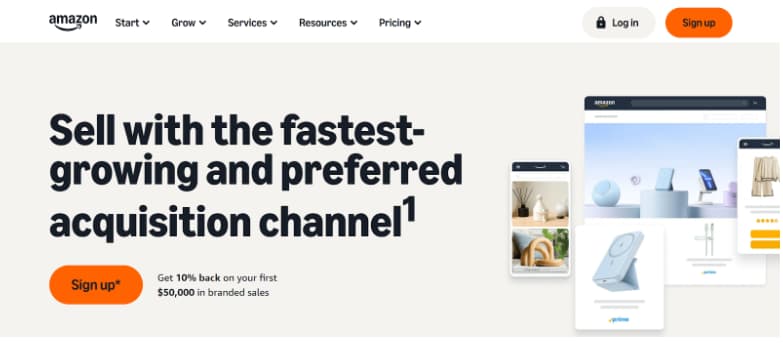
Sellers ship their inventory to Amazon warehouses, where the company handles storage, packaging, shipping, and customer support to ensure seamless operations.
This model provides immediate access to Amazon’s millions of active customers while reducing operational burdens for busy entrepreneurs.
Pricing Comparison: Shopify vs Amazon FBA
Shopify offers monthly plans starting at $29 with a free trial, while Amazon FBA charges $0.99 per item for individuals or $39.99 monthly for professionals, plus referral and fulfillment fees.
Shopify Pricing
| Plans | Montly | Annually |
|---|---|---|
| Basic | $39 | $29 |
| Grow | $105 | $79 |
| Advanced | $399 | $299 |
| Plus | $2,300 | $2,300 |
- Basic ($29/month): Offers up to 77% shipping discount and 10 inventory locations. Includes 24/7 chat support and POS Lite.
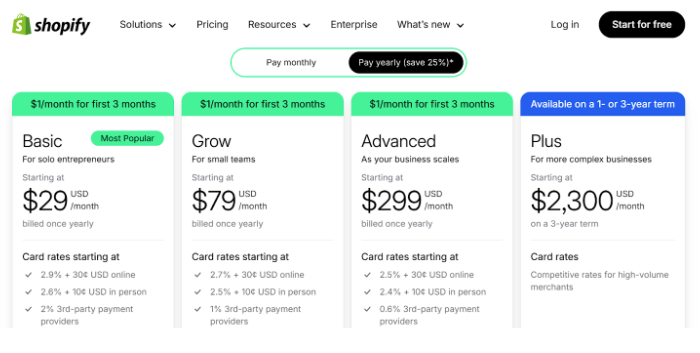
- Grow ($79/month): Provides up to 88% shipping discount with insurance. Comes with 5 additional staff accounts and localized global selling.
- Advanced ($299/month): Features enhanced 24/7 chat support and 15 staff accounts. Allows adding extra markets for $59 per month, as well as third-party calculated rates.
- Plus ($2,300/month): Includes priority 24/7 phone support and 200 inventory locations. Offers unlimited staff accounts and fully customizable checkout.
Start for free, then $1/month for 3 months of promotional pricing helps new merchants test platform capabilities before committing.
Amazon FBA Pricing
| Plans | Price |
|---|---|
| Individual | $0.99/ item sold |
| Professional | $39.99 / month |
- Individual Plan: This plan charges $0.99 per item sold and is ideal for sellers listing one product at a time. It includes essential selling tools but no monthly subscription fee.
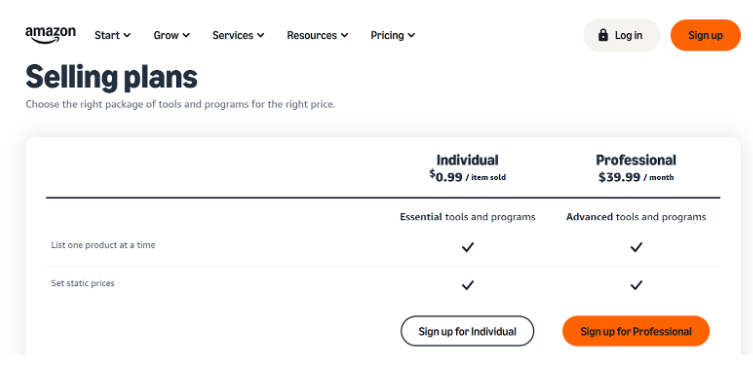
- Professional Plan: Priced at $39.99 per month, it offers advanced tools like bulk listing, automated pricing, and access to advertising. This plan suits growing sellers needing more control and features.
- Referral Fees: Amazon charges a referral fee based on product category, typically a percentage of the sale or a minimum fixed amount, whichever is greater. Fees vary from 5% to 45% depending on the category.
Amazon FBA vs Shopify: Key Features Comparison
Amazon FBA handles fulfillment and marketplace reach, whereas Shopify offers complete branding control and customizable marketing tools for businesses.
1. Scalability And Growth
Shopify scales seamlessly with businesses through flexible infrastructure supporting high transaction volumes and customizable features for evolving needs. The platform handles over 10,000 transactions per minute, offering more than 8,000 apps to enhance functionality as businesses expand.
Amazon FBA offers instant scalability through established logistics networks that reach global markets, eliminating the need for sellers to invest in infrastructure. However, scaling on Amazon means accepting increased competition and reduced profit margins as more sellers enter categories.
2. Marketing Tools
Shopify includes comprehensive marketing features like email campaigns, SEO optimization, social media integration, and detailed analytics for customer acquisition. Merchants control entire marketing strategies, enabling personalized campaigns and brand-building initiatives that drive long-term customer loyalty and retention.
Amazon offers advertising tools, including Sponsored Products, Sponsored Brands, and Display Ads, targeting customers actively searching for products. The platform’s built-in traffic eliminates the need for cold marketing, but sellers compete directly against similar products in search results.
3. Fulfillment Options
Shopify merchants handle fulfillment independently or partner with third-party logistics providers for storage, packaging, and shipping operations. This flexibility allows custom packaging, personalized notes, and unique unboxing experiences that reinforce brand identity and customer satisfaction.
Amazon FBA manages entire fulfillment processes from warehousing to customer service, enabling hands-off operations for busy entrepreneurs. Prime eligibility and fast shipping options increase conversion rates, but sellers sacrifice packaging customization and direct customer relationships.
4. Control Over Product
Shopify provides complete autonomy over product presentation, pricing strategies, promotional campaigns, and customer communication without platform restrictions. Merchants own customer data, control inventory decisions, and implement unique selling propositions that differentiate brands from competitors.
Amazon restricts seller control through strict policies governing product listings, pricing, customer communication, and promotional activities within marketplace guidelines. Platform algorithm changes can significantly impact product visibility and sales performance without providing sellers with input or advance notice.
5. Customer Data Access
Shopify grants full access to customer information, including purchase history, contact details, and behavioral data, for the purpose of personalized marketing campaigns. This data ownership enables sophisticated segmentation, targeted email marketing, and customer lifetime value optimization strategies for sustainable growth.
Amazon limits customer data access to protect its marketplace ecosystem, preventing sellers from building direct relationships outside the platform. Sellers receive basic order information but cannot access customer email addresses or implement independent retention marketing strategies.
Shopify vs Amazon FBA: User Interface
This user-friendly approach reduces the learning curve, enabling entrepreneurs to focus on growing their business rather than managing technical complexities.
Shopify User Interface
Shopify features an intuitive dashboard designed for non-technical users. The clean interface organizes orders, products, customers, and analytics in easily navigable sections. Drag-and-drop store builders enable quick customization without coding knowledge.
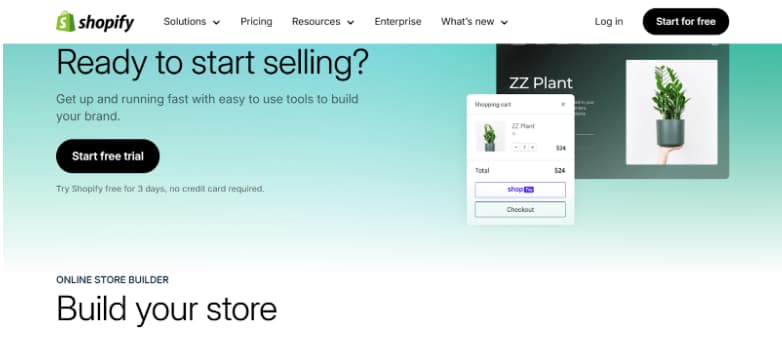
Mobile-responsive admin panels allow management from anywhere, while the extensive theme library provides professional designs suitable for various industries.
Amazon FBA User Interface
Amazon Seller Central presents a comprehensive but complex interface packed with detailed analytics and management tools. The learning curve is steeper due to numerous features and compliance requirements.
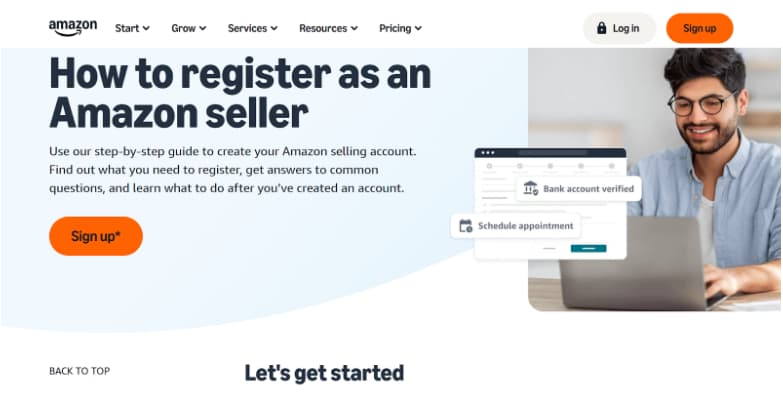
Creating a product listing involves multiple steps and adhering to strict formatting guidelines. However, reporting tools provide detailed sales data, inventory tracking, and performance metrics essential for marketplace success.
Shopify vs Amazon FBA: Integration Apps & Websites
These integrations streamline business operations by automating workflows and synchronizing data across multiple platforms.
Shopify Integration Sites
Shopify’s App Store features over 8,000 applications that cover email marketing, inventory management, customer service, accounting, and social media integration. Popular integrations include Mailchimp, QuickBooks, Facebook, Instagram, Google Analytics, and Klaviyo.

The platform seamlessly integrates with dropshipping suppliers, print-on-demand services, and multi-channel selling platforms, providing comprehensive business management.
Amazon FBA Integration Sites
Amazon integrates with accounting software like QuickBooks and Xero, inventory management systems, and repricing tools. Third-party applications help manage PPC campaigns, keyword research, and competitor analysis.
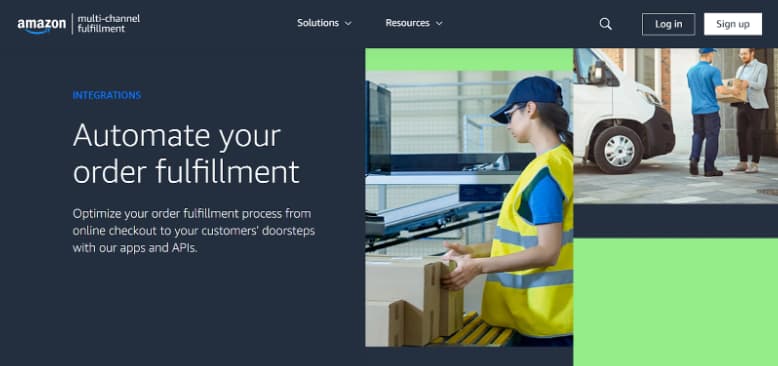
Integration options are more limited compared to Shopify, focusing primarily on operational efficiency rather than marketing expansion. Popular tools for Amazon-specific optimization include Jungle Scout, Helium 10, and FeedbackWhiz.
Pros And Cons Of Shopify Vs Amazon FBA
Understanding the advantages and limitations helps entrepreneurs make informed decisions about platforms.
Shopify Pros and Cons
Shopify empowers merchants with complete control over brand presentation and customer relationships.
Pros:
- Complete brand customization and design control
- Full ownership of customer data and relationships
- Lower transaction fees compared to marketplace commissions
- Extensive app ecosystem for enhanced functionality
- No competition from other sellers on your storefront
Cons:
- Requires self-driven traffic generation and marketing
- Higher initial marketing costs to build brand awareness
- Inventory and fulfillment management responsibilities
Amazon FBA Pros and Cons
Amazon FBA provides immediate access to an established customer base with hands-off fulfillment services.
Pros:
- Instant access to millions of active shoppers
- Amazon handles storage, shipping, and customer service
- Prime eligibility increases conversion rates
- Built-in trust and credibility from the Amazon brand
- Global marketplace reach without an international setup
Cons:
- High referral fees and FBA costs reduce profit margins
- Limited control over customer data and relationships
Shopify vs Amazon FBA: Who Should Go For It?
Platform selection depends on business goals, resources, and long-term growth strategies. Shopify suits entrepreneurs who prioritize brand building and control over customer relationships. Amazon FBA serves sellers prioritizing quick market entry and operational simplicity.
Shopify Best For
- Businesses focused on building unique brand identities
- Companies with existing marketing expertise or budget
- Sellers wanting complete control over the customer experience
- Merchants selling premium or luxury products
- Entrepreneurs planning long-term brand development
Amazon FBA Best For
- New sellers without an existing customer base
- Businesses seeking rapid market validation
- Entrepreneurs prefer hands-off fulfillment operations
- Sellers with products suited for mass market appeal
- Companies wanting to test products before brand investment
Shopify vs Amazon FBA: Which One Is Better To Use?
Shopify excels for brand-focused businesses willing to invest in marketing and customer acquisition for long-term growth and loyalty. Amazon FBA is best suited for sellers who prioritize quick revenue generation and operational simplicity over brand control and customer relationships.
Choosing between Shopify and Amazon FBA depends on your business goals. Shopify is best if you value control, branding, and long-term customer relationships. Amazon FBA is ideal for reaching a large audience fast with minimal operational work.
Related Read:
Final Thoughts – Using Shopify And Amazon FBA Together Maximizes Growth Potential!
Shopify and Amazon FBA both offer powerful tools for e-commerce success. Shopify gives complete brand control, while Amazon FBA offers unmatched reach and streamlined fulfillment support.
Using both platforms can help sellers maximize visibility and efficiency. You can drive traffic via Shopify’s marketing tools while tapping into Amazon’s vast customer base for quicker conversions.
To get the best results, start with one platform, master it, then expand. Utilize Shopify for brand-building and customer engagement, and leverage Amazon FBA for logistics and increased exposure. Continuously monitor performance and optimize based on data.
FAQs
Combining Shopify and Amazon FBA enhances growth opportunities. Many sellers leverage Shopify for branding while utilizing Amazon FBA for order fulfillment.
Amazon FBA can be worthwhile for small businesses if profit margins support the fees. It’s particularly valuable for companies lacking fulfillment infrastructure.
Both platforms support paid advertising. Shopify supports Google or Facebook ads; Amazon has its own PPC system.
Shopify can be worth it for beginners. It’s beginner-friendly with customizable templates and firm support.
You can use your custom domain with Shopify. Amazon does not support personal domains for storefronts.

